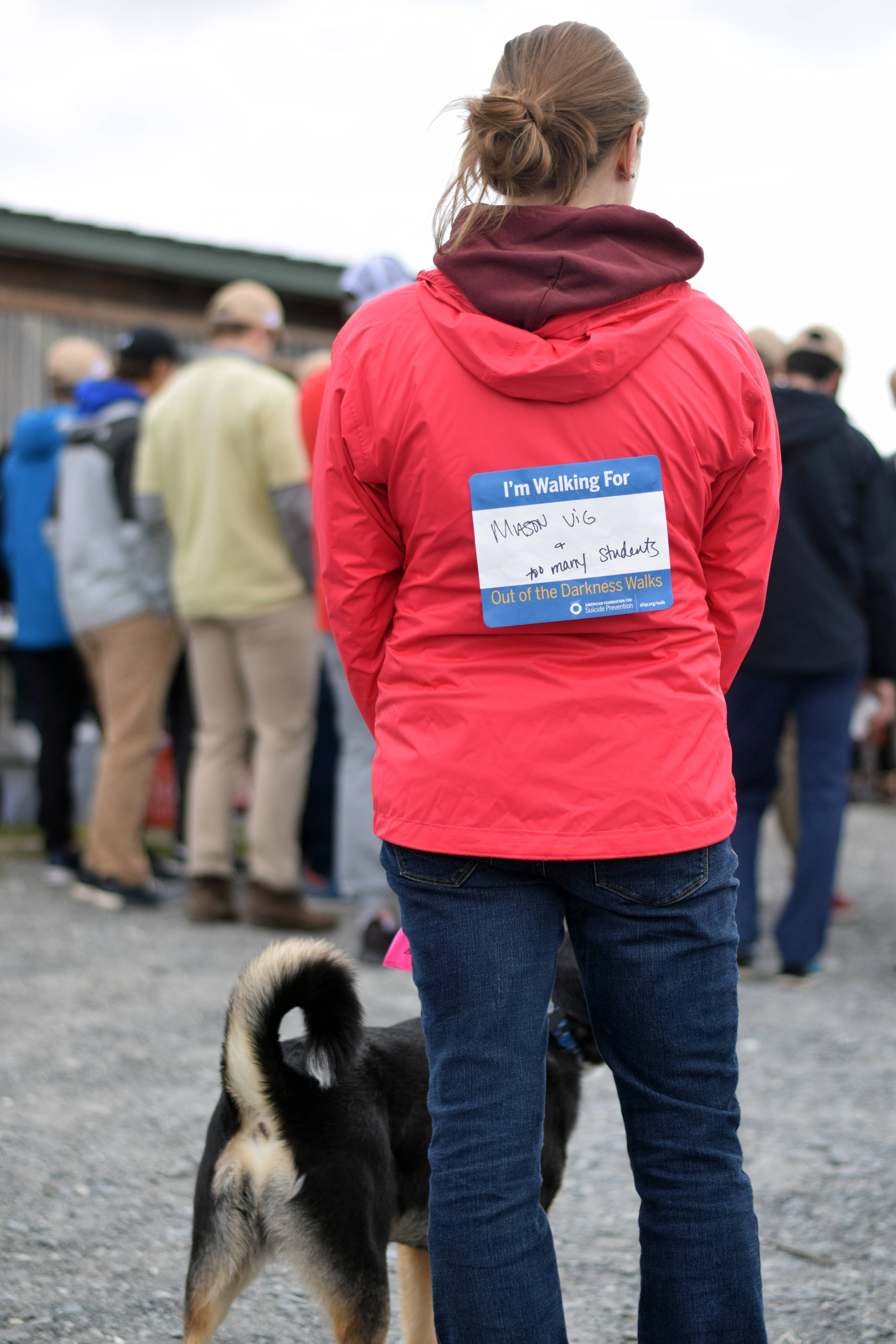Suicide rates in Alaska are at a 20-year high and it is the leading cause of death among Alaskans age 10 to 34, according to Alaska Health Analytics and Vital Records, but it’s not the numbers that people need to talk about.
The main message being spread at the beach during the Out of the Darkness Walk in Kenai on Sunday was empathy, not statistics.
“Hey, are you doing okay?”
The question isn’t intended to pry. It’s a simple question that could save a life or, at least, start a conversation for anyone suffering through suicidal thoughts.
“The empathy and kindness that we can show to someone makes a difference,” said Pegge Erkeneff before the start of the two mile walk on Sunday afternoon. “… Think about the ways that laughter, play, love and care for each other can walk into all the moments of our life.”
Erkeneff, whose son, Justin Bernecker, died of suicide when he was 16-years-old, spoke about her struggle with the unexpected loss to a group of community members, victims of suicide and supporters in front the the Kenaitze Indian Tribe’s fishery site in Kenai before the start of a two mile walk along the shore of the Cook Inlet.
The walk was organized by the tribe’s suicide prevention Yinihugheltani, which means ‘one spirit.’ Although the pronounciation may be difficult, the group’s message is simple — ‘we need you here.’
“Our community, right now, seems really hungry to do something about suicide prevention,” Program Coordinator Audre Gifford said. “We got resolutions from the Kenai City Council, Tribal Council and Soldotna City Council recognizing today as World Suicide Prevention and Awareness Day, so we wanted to do an event where our community could come out and support each other to help heal, help grow and help support the cause.”
The prevention group has been working throughout the past year to spread their message and to start a conversation about suicide. Although there is no single cause or solution of suicide, the group says that knowing the warning signs, understanding the risk factors and connecting for support can help.
Gifford recommends that anyone suffering from suicidal thoughts call Alaska’s Careline at 1-800-273-8255 (TALK). The careline helps people in crisis, those who are grieving and people who may just need to talk to someone. She also recommends reaching out to any of the behavioral health centers in the area or to a friend or loved one.
Chelsey Carter, who walked in recognition of the family she’s lost to suicide, reaffirmed how pivotal someone to talk to can be.
“I lost my younger brother five years ago and my uncle this year,” Carter said. “There’s always a person willing to listen if you’re willing to talk. If my brother had just stopped to take a breath and talk it through, it could’ve been different.”
It’s also important to focus on those who are left behind after a suicide, said Lynette Knapp, who was walking in memory of a granparent who died by suicide and in support of the cause.
“Post-vention is prevention,” Knapp said. “When we take care of those that are left behind, we’re doing prevention… It’s so important that we take care of those that are left behind, so that’s why I’m walking.”
After losing her son, Erkeneff moved from Colorado and found solace in the Alaska landscape.
“This land really helped heal me,” Erkeneff said, but not without caution. “It also is a really lonely place.”
To combat the state’s affinity towards solitude, Gifford said the tribe will be hosting a lot of activities as the months grow colder and the nights get longer.
“Our program hosts a lot of activities for the community to connect during those dark nights,” Gifford said. “It’s important, too, to exercise and get those endorphines up, but look at the tribe’s website to see the activities we’re doing because we really like to pull people out of their houses to get together and connect as a community.”
Suicide isn’t just a problem in Alaska, though, it’s an issue across the world.
Cheryl and Peary Polley travelled from Tuscon, Arizona to walk in memory of their son Daniel Polley, who took his life when he was 24-years-old after years of struggling with suicidal thoughts.
“Once he took his life, our voices have been trying to reach out to others to support wherever we can,” Peary said. “We are trying to attend walks in different states.”
Cheryl added that they were celebrating Daniel’s life, and who he was, while supporting the prevention of suicide.
“He was just starting out in life, but it’s just so hard to see through those blinders when you don’t have hope,” Cheryl said. “And as much as we told him how wonderful he was … we kept him here on this earth as long as we could.”
Reach Kat Sorensen at kat.sorensen@peninsulaclarion.com

